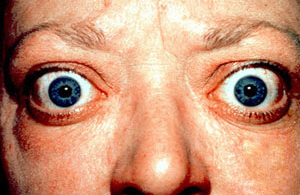¿Lo sabías?
Puedes hacer doble clic en una palabra para buscarla en TermGallery.
Puedes hacer doble clic en una palabra para buscarla en TermGallery.
Significados de Graves' disease en inglés
portugués
doença de graves 
Autoimmune disease of endocrine system that involves production of excessive amount of thyroid hormones, located in thyroid gland.
Uso de Graves' disease en inglés
1
Conclusion: There are four subpopulations of Japanese patients with hyperthyroid Graves' disease.
2
Objectives: We evaluated the results of orbital decompression in patients with Graves' disease.
3
In Graves' disease there is an excessive production of thyroid secretion.
4
Excessive doses of iodin alone cause most of the symptoms of Graves' disease.
5
The victims of Graves' disease present a counterpart of emotional exhaustion.
6
Patients: Eighty-eight Japanese patients with hyperthyroid Graves' disease and 186 control subjects were assessed.
7
These two positive cases were subsequently diagnosed as Graves' disease with severe lymphocytic infiltration.
8
Increased levels in active Graves' disease may also partly be caused by immunological activation.
9
The nervous system in Graves' disease is hypersusceptible to stimuli and to thyroid extract.
10
The genetic loci conferring susceptibility to Graves' disease remain unclear.
11
How could disappointment in love play a role in the causation of Graves' disease?
12
Sixteen had Graves' disease and 5 had toxic nodular goiter.
13
The usual cause is a derangement of the body's immune system-known as Graves' disease.
14
Antithyroid drugs are widely used in human medicine for the medical management of Graves' disease.
15
It has offered a plausible explanation of the cause and the treatment of Graves' disease.
16
We reported a 49 years old male patient of Graves' disease with bilateral optic neuropathy.

